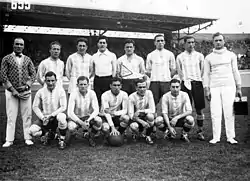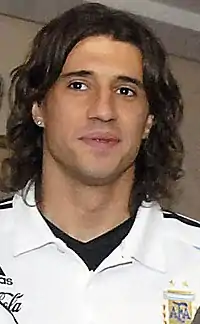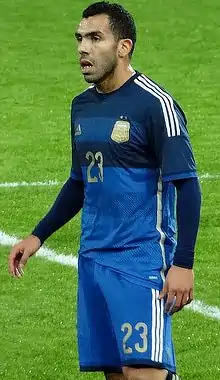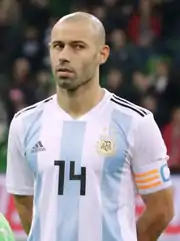Argentina national under-23 football team
The Argentina Olympic football team represents Argentina in international football competitions during Olympic Games and Pan American Games. The selection is limited to players under the age of 23, except three overage players. The team is controlled by the Argentine Football Association (AFA).
History
First participation and podium

Argentina took part for the first time in the 1928 Olympic Games held in the Netherlands. The team advanced to the final after defeating United States with a thrashing 11–2 in the first round, and Belgium (6–3) in the second. In the semi-finals, the national team smashed Egypt by 6–0 to qualify for the final against Uruguay.
The first match ended in a 1–1 tie so a second game had to be played three days later. In the decisive match, Uruguay won the tournament after defeating Argentina 2–1, winning the Gold Medal. The Argentine line-up was Bossio, Bidoglio, Paternóster, Médice, Monti, Evaristo, Carricaberri, Tarasconi, Ferreira, Perduca, Orsi. Tarasconi was also the topscorer of the competition with 11 goals.[1]
Amateur teams era
In 1932 no football tournament was held, restarting the activities in 1936 (where Argentina did not take part), being interrupted due to World War II until 1948. Because of an agreement between FIFA and the IOC, only amateur players were allowed to play in the football tournaments from then on.
Argentina returned to football competition in the 1960 games held in Rome. The squad was eliminated in the first round after a 3–2 loss to Denmark, although the team won its successive games against Tunisia (2–1) and Poland (2–0). Argentina placed second to Denmark.[2]
Argentina's next participation was in the 1964 Summer Olympics organized by Tokyo, where the team finished in the last position of the group after a 1–1 draw with Ghana and a 2–3 loss to Japan.[3] Since then, Argentina had a long absence of the games, not having taken part in the 1968, 1972, 1976, 1980 and 1984 Olympics.
Professional teams again
The national team returned for the 1988 Summer Olympics held in Seoul. The changes made by the IOC allowed the squad to include professional players in its list, some of them with several years playing in Argentine Primera División, such as Luis Islas, Pedro Monzón, Néstor Fabbri, Darío Siviski and Jorge Comas, among others. In the group stage, Argentina tied 1–1 to the United States, then beat South Korea by 2–1, finishing second to the Soviet Union and qualifying to the next stage. In the quarter-finals, Argentina lost to Brazil 2–1, being eliminated from the competition.[4]
Since the 1992 edition, the IOC stated that all football players should be under 23 years old, beyond they were professional or not. Coached by Alfio Basile, Argentina went to play the qualification tournament with experienced players such as Diego Simeone, Diego Latorre, Antonio Mohamed, Fernando Gamboa and Leonardo Astrada, who had also won the Copa América one year before.[5] Nevertheless, Argentina did not qualify to play the games, finishing 3rd. after Paraguay and Colombia.[6]
Since the 1996 Games, the IOC allowed squads to include a maximum of three over-23 players in their rosters.
Return to the podium
Argentina came back to the competition in the 1996 edition held in Atlanta, United States. For the first time in the history of the Olympics, the IOC allowed football representatives to register a maximum of three above-23 players. The Argentine players registered under that condition were Diego Simeone, José Chamot and Roberto Sensini. Former senior team captain Daniel Passarella was the manager.
The national team debuted with a 3–1 victory over the United States, then tied to Portugal and Tunisia, both 1–1, to finish first the group and qualify for the second round. In the quarter-finals, Argentina trashed Spain 4–0 which allowed the team to pass to the semi-finals, where it defeated Portugal 2–0. After 66 years since the first final played in Amsterdam, Argentina reached its second Olympic final. The match was played on 3 August 1996 and Argentina lost to Nigeria 2–3.[7] The line-up for the final was: Cavallero; Javier Zanetti, Roberto Ayala, Roberto Sensini, José Chamot; Christian Bassedas, Matías Almeyda, Ariel Ortega, Hugo Morales; Claudio López and Hernán Crespo. Other players squad players included Carlos Bossio, Marcelo Gallardo and Marcelo Delgado.[8] In the next edition of the Games, 2000, Argentina did not participate.
First gold
The 2004 Summer Olympics were held in Athens and Argentina returned to the competition after the absence in Sydney. The squad, managed by Marcelo Bielsa, won the gold medal for the first time in its history. Before playing the final, Argentina won all the games in the first round, thrashing Serbia and Montenegro 6–0 then defeating Tunisia and Australia. Argentina finished first in the group with no goals conceded. In the quarter-finals, Argentina smashed Costa Rica 4–0, reaching the semi-finals against Italy which it beat 3–0. Argentina played the final against Paraguay on 28 August 2004, winning not only the game (1–0) but the gold medal as well.
Argentina won the competition with an astounding campaign, winning the six matches played, with no goals allowed during the tournament. The team also totaled 17 goals (2.83 per match). The line-up for the final was: Germán Lux; Fabricio Coloccini, Roberto Ayala, Gabriel Heinze; Lucho González, Javier Mascherano, Kily González, Andrés D'Alessandro, Carlos Tevez; Mauro Rosales and César Delgado. The most notable player of the tournament was Tevez, who finished as topscorer with eight goals.[9][10]
Second gold

The 2008 Summer Olympics were held in Beijing where Argentina won their second consecutive gold medal. The squad debuted with a 2–1 victory over the Ivory Coast, then defeating Australia (1–0) and Serbia (2–0). In the knockout stage, Argentina eliminated the Netherlands (aet) by 2–1, thrashed Brazil by 3–0 and won the gold medal in the final match against Nigeria, 1–0.
Argentina won all the matches played (six), scoring 11 goals with only two conceded. Some of the most notable players of the tournament were Lionel Messi, Sergio Agüero, Ángel Di María, Éver Banega, Ezequiel Lavezzi, Fernando Gago and Pablo Zabaleta, who would all play for the senior team in successive years. The three over-23 years players were Juan Román Riquelme, Javier Mascherano and Nicolás Pareja.
2012–present
.jpg.webp)
Argentina did not qualify for the 2012 Summer Olympics in London.
For the 2016 competition held in Rio de Janeiro, most of the players called up for the squad were not given permission to play by their respective clubs, including Paulo Dybala, Mauro Icardi, Matías Kranevitter, Luciano Vietto, Ramiro Funes Mori and goalkeeper Augusto Batalla, among others.[11] After the resignation of Gerardo Martino as coach, Julio Olarticoechea (who was the Argentina U-20 coach) was appointed to take over the team.[12]
At Rio 2016, the squad debuted with a 2–0 loss to Portugal, then defeating Algeria 2–1. In the last fixture of group stage, Argentina drew 1–1 with Honduras, which caused the squad finished third in the group, not enough to qualify for the next round.[13] Some of Argentina's players were Ángel Correa, Jonathan Calleri and Cristian Pavón.
Competitive record
Olympic Games
| Olympic Games record | ||||||||||
|---|---|---|---|---|---|---|---|---|---|---|
| Year | Host | Round | Position | GP | W | D | L | GS | GA | |
| Until 1988 | See Argentina national football team | |||||||||
| 1992 | Did not qualify | |||||||||
| 1996 | Silver medalists | 6 | 3 | 2 | 1 | 13 | 6 | |||
| 2000 | Did not qualify | |||||||||
| 2004 | Gold medalists | 6 | 6 | 0 | 0 | 17 | 0 | |||
| 2008 | Gold medalists | 6 | 6 | 0 | 0 | 11 | 2 | |||
| 2012 | Did not qualify | |||||||||
| 2016 | Group stage | 11th | 3 | 1 | 1 | 1 | 3 | 4 | ||
| 2020 | Qualified | |||||||||
| Total | 2 Gold medals | 5/8 | 21 | 16 | 3 | 2 | 44 | 12 | ||
CONMEBOL Pre-Olympic Tournament
| CONMEBOL Pre-Olympic Tournament record | ||||||||
|---|---|---|---|---|---|---|---|---|
| Year | Host | Position | GP | W | D | L | GS | GA |
| 1960 | 6 | 6 | 0 | 0 | 25 | 6 | ||
| 1964 | 5 | 5 | 0 | 0 | 11 | 1 | ||
| 1968 | Did not participate | |||||||
| 1971 | 7 | 1 | 5 | 1 | 7 | 6 | ||
| 1976 | 5 | 2 | 1 | 2 | 7 | 8 | ||
| 1980 | 6 | 5 | 1 | 0 | 13 | 2 | ||
| 1984 | Did not participate | |||||||
| 1987 | 7 | 3 | 3 | 1 | 8 | 2 | ||
| 1992 | 5th | 4 | 2 | 1 | 1 | 4 | 3 | |
| 1996 | 7 | 6 | 1 | 0 | 21 | 3 | ||
| 2000 | 7 | 3 | 1 | 3 | 12 | 9 | ||
| 2004 | 7 | 5 | 2 | 0 | 16 | 8 | ||
| 2020 | 7 | 6 | 0 | 1 | 14 | 8 | ||
| Total | 5 Gold medals | 68 | 44 | 15 | 9 | 138 | 56 | |
Pan American Games
| Pan American Games record | |||||||||
|---|---|---|---|---|---|---|---|---|---|
| Year | Host | Round | Position | GP | W | D | L | GS | GA |
| Until 1995 | See Argentina national football team | ||||||||
| 1999 | Did not qualify | ||||||||
| 2003 | Gold medalists | 5 | 5 | 0 | 0 | 10 | 5 | ||
| 2007 | Preliminary round | 9th | 3 | 0 | 2 | 1 | 1 | 3 | |
| 2011 | Silver medalists | 5 | 3 | 1 | 1 | 6 | 2 | ||
| 2015 | Did not enter | ||||||||
| 2019 | Gold medalists | 5 | 4 | 0 | 1 | 14 | 6 | ||
| Total | 2 Gold medals | 4/6 | 18 | 12 | 3 | 3 | 31 | 16 | |
Team
Current squad
The following players were selected for the 2020 CONMEBOL Pre-Olympic Tournament from 18 January through 9 February 2020.[14][15][16][17]
| No. | Pos. | Player | Date of birth (age) | Club |
|---|---|---|---|---|
| 1 | GK | Facundo Cambeses | 9 April 1997 (aged 22) | |
| 2 | DF | Nehuén Pérez (captain) | 24 June 2000 (aged 19) | |
| 3 | DF | Claudio Bravo | 13 March 1997 (aged 22) | |
| 4 | DF | Marcelo Herrera | 3 November 1998 (aged 21) | |
| 5 | MF | Fausto Vera | 26 March 2000 (aged 19) | |
| 6 | DF | Nazareno Colombo | 20 March 1999 (aged 20) | |
| 7 | MF | Juan Brunetta | 12 May 1997 (aged 22) | |
| 8 | MF | Nicolás Capaldo | 14 September 1998 (aged 21) | |
| 9 | FW | Adolfo Gaich | 26 February 1999 (aged 20) | |
| 10 | MF | Alexis Mac Allister | 24 December 1998 (aged 21) | |
| 11 | MF | Matías Zaracho | 10 March 1998 (aged 21) | |
| 12 | GK | Juan Pablo Cozzani | 9 October 1998 (aged 21) | |
| 13 | GK | Joaquín Blázquez | 28 January 2001 (aged 18) | |
| 14 | DF | Facundo Medina | 28 May 1999 (aged 20) | |
| 15 | DF | Maximiliano Centurión | 20 February 1999 (aged 20) | |
| 16 | DF | Hernán de la Fuente | 7 January 1997 (aged 23) | |
| 17 | MF | Tomás Belmonte | 27 May 1998 (aged 21) | |
| 18 | MF | Gastón Togni | 20 September 1997 (aged 22) | |
| 19 | FW | Nahuel Bustos | 4 July 1998 (aged 21) | |
| 20 | FW | Julián Álvarez | 31 January 2000 (aged 19) | |
| 21 | FW | Valentín Castellanos | 3 October 1998 (aged 21) | |
| 22 | FW | Agustín Urzi | 4 May 2000 (aged 19) | |
| 23 | DF | Facundo Mura | 24 March 1999 (aged 20) |
Gallery
 Raimundo Orsi, silver medalist in 1928
Raimundo Orsi, silver medalist in 1928 Domingo Tarasconi, all-time top scorer (9 goals in 1928)
Domingo Tarasconi, all-time top scorer (9 goals in 1928) Hernán Crespo, 1996 top scorer (6 goals)
Hernán Crespo, 1996 top scorer (6 goals) Carlos Tevez, 2004 top scorer (8 goals)
Carlos Tevez, 2004 top scorer (8 goals) Javier Mascherano, winner of two gold medals and highest-capped player ever
Javier Mascherano, winner of two gold medals and highest-capped player ever Lionel Messi won the gold medal in 2008
Lionel Messi won the gold medal in 2008 Sergio Agüero, part of the 2008 team
Sergio Agüero, part of the 2008 team
References
- Games of the IX Olympiad at RSSSF
- Games of the XVII Olympiad
- Games of the XVIII Olympiad
- Games of the XXIV Olympiad
- 1992 Y 2000, LAS DOS GRANDES DESILUSIONES PREOLÍMPICAS on Goal.com
- Games of the XXV. Olympiad - Football Qualifying Tournament by Russell Gerrard, Andre Zlotkowski and Lars Aarhus on RSSSF
- "1996: Nigeria tocó el cielo olímpico" at Univisión
- Games of the XXVI Olympiad
- "Argentina era campeón olímpico de la mano de Bielsa en Atenas 2004", PlayFutbol, 27 December 2012
- Games of the XXVIII Olympiad
- La selección olímpica, abandonada: faltan jugadores y ni siquiera hay plata para "pagar el almuerzo", La Nación, 30 Jun 2016
- Olarticoechea, el técnico de la Sub 20, fue designado para dirigir en los Juegos Olímpicos, La Capital, 6 Jul 2016
- "La Selección no pudo con Honduras y quedó afuera en primera ronda", Clarín, 10 Aug 2016
- "Con tres cambios y una incorporación de último minuto, así quedó la lista final de la Selección Sub 23 para el Preolímpico de Colombia" (in Spanish). Infobae. 4 January 2020.
- "Juan Brunetta se suma a la lista de convocados para el Preolímpico" [Juan Brunetta joins the summoned players for the Pre-Olympic] (in Spanish). AFA. 15 January 2020.
- "Las 230 promesas olímpicas" (in Spanish). CONMEBOL.com. 10 January 2020.
- "CONMEBOL PREOLÍMPICO COLOMBIA 2020 LISTA DE JUGADORES/LISTA DE JOGADORES" (PDF). Conmebol.com (in Spanish). Confederación Sudamericana de Fútbol. 10 January 2020.
